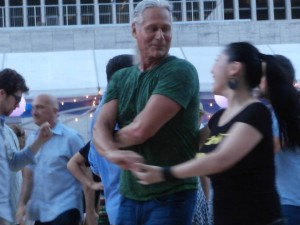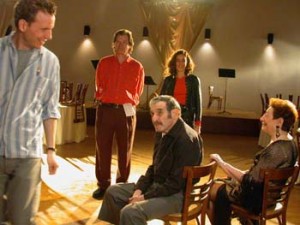Not that long ago I went to an event near my home, Midsummer Night Swing. It’s put on every summer by Lincoln Center. They erect a dance floor in one of the plazas, invite some amazing musicians to perform danceable music of many genres (swing, merengue, salsa, disco and more), and let the paying public on the dance floor while a whole other dance scene takes place beyond the dance floor. There is a lot of joy concentrated around Lincoln Center when Midsummer Night Swing is happening.

I started attending Midsummer Night Swing when I first moved into this neighborhood. It inspired a screenplay, Wigs by Coco (1999), that was set in the then burgeoning swing revival scene, and later it inspired Tango Octogenario (2003). I went several nights this year, but anticipated tango night most of all. I had hoped I would see an old friend, Alex Turney, one of the stars of Tango Octo.
And I did. Alex is in his 90s now, not as spry as when we filmed him and his wife, Jean, who died several years ago. But he was still on the dance floor. I yelled his name and he and the person he was with, an attractive woman of about 40, turned. (Alex is beloved and has many people who check in on him and take him where he needs to go, whether that’s a doctor’s appointment or a milonga.) They found me on the perimeter of the dance floor — I was not one of the paying public. He didn’t recognize me at first, but when I repeated my name and added “the filmmaker” it came back to him. He began to gush about me to his companion in superlatives that make me uncomfortable. But what touched me most was when he began quoting lines from the press materials I used to send out. (Alex requested every little Tango Octo thing that I created, postcards, poster, stills, press kit.) Alex said, “’the portrayal of seniors as active, vibrant, and independent is a much-needed antidote to the stereotypical representations of America’s graying population.’ Who writes such a beautiful thing? Can you believe it?” Alex is quite the sweet talker.

I once heard Alex say, “Tango is a three-minute love affair.” One might say the same thing about making a film. You work very intensely with people, you share meals, war stories, secrets, and then suddenly it ends, and you’re on another set with another crew where it happens again. It lasts longer than three minutes, but it’s still pretty brief. I’m not sure if people who are born with that tendency gravitate to the profession or if they become that way because of the profession. This happens with documentary filmmakers as well, often with their subjects. Filmmakers woo them to be in their film, lavish attention on them, making them feel special. We share our secrets with them and get the subjects to share their secrets in front of a camera.
And then we leave. And what’s worse, the trust we established with our subjects is violated, because we reveal all those secrets to the world, edited in a way they can’t control with moving pictures over their words they did not intend to be there. It’s part of the deal, and if you can’t stomach it, documentary filmmaking is not for you. Sometimes I have a difficult time stomaching it.
Anywho, note that I did write “some.” I know many filmmakers who develop lasting relationships with their subjects and crew. I happen to think I’m one of those filmmakers. Alex Turney and I, we are bound for as long as life will allow. He knew that and expressed it once he saw the finished film at New Directors/New Films. We don’t see each other frequently, and mostly that’s my fault, but judging by the way Alex held my hands that night, frequency isn’t an issue.
It’s the same with the subjects of A Life’s Work. I like to think that we will be linked for a good many years and, in my fantasy world, the subjects are also entwined, though they’ve never met each other. (Yet!)
This tight bond the work creates, it’s one of my favorite things about filmmaking and compensates for the less savory aspects. I don’t know that I’d do it if that weren’t part of the deal.
Coda: I started writing this July 17. On July 18th, I was surprised to learn William Swearson was stopping in NYC for a couple of days. I met Will on the second SETI shoot in 2007, while he was spending his summer in the SETI REU program (Research Experience for Undergraduates). I offered him my couch and he took me up on it. Will is one of the students I stayed in touch with and he contributed one of the most moving posts on this blog. We had a swell evening full of good food and stimulating conversation.
Coda coda: On July 19th I received an email from someone putting on a tango event in NYC on July 20th. They wanted to screen Tango Octogenario. Alex Turney was to be present and I was invited to attend. I did. It was a small affair. Alex and I sat in the front row, and afterwards answered a couple of questions. When it was over I said goodbye, hugged Alex, and as is his way, he kissed me on the cheek. I love that.
Here’s Alex and Jean and I after I called “that’s a wrap” (there is no sound) and a clip of me thanking Paolo Soleri for sitting down to speak with me. You can read more about this clip in this post.
See also: The Most Wonderful Thing in the World

MEHope
Perfection. Lovely essay, David.
I suppose a residency together gets a slice of that bond too?
David Licata
Oh, thank you SO much, Mary. I’m deeply flattered.
Yes, I think a similar, intense bond can happen at residencies. In fact, they have happened. I’ve met the vast majority of my friends at residencies. I do not let them go, either. That’s my steadfast heart, I suppose, for better or for worse.